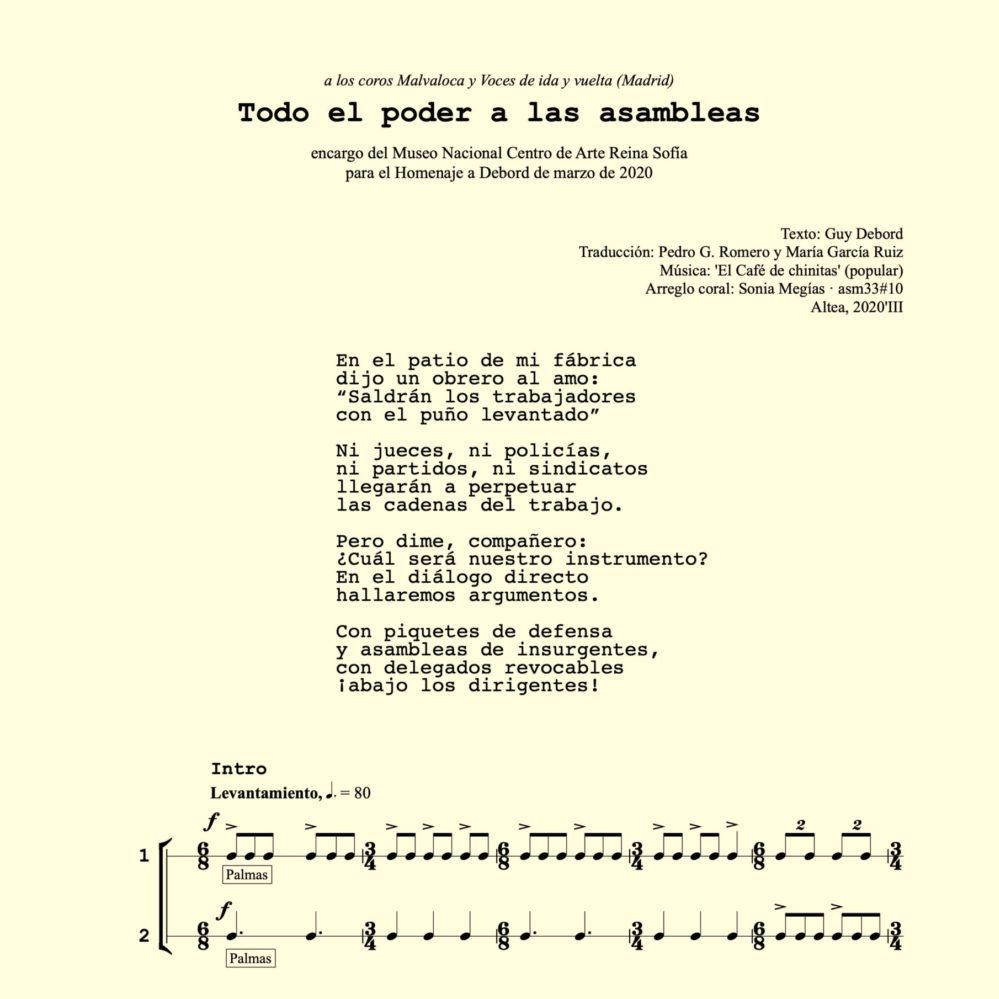Description
Song TODO EL PODER A LAS ASAMBLEAS
(music from El Café de Chinitas)
Compilation and translation by Pedro G. Romero and María García Ruiz
Choral arrangement by Sonia Megías
En el patio de mi fábrica
dijo un obrero al amo
“saldrán los trabajadores
con el puño levantado”
ni jueces ni policías
ni partidos ni sindicatos
llegarán a perpetuar
las cadenas del trabajo
pero ¿dime compañero
cuál será nuestro instrumento?
en el diálogo directo
hallaremos argumentos
con piquetes de defensa
con asambleas de insurgentes
con delegados revocables
¡abajo los dirigentes!
Introduction to the concert Ten Songs for the Contemporary Social War
With the publication of this selection of songs, heard in different places different times, we have no other objectives than to make known the Spanish reality of the neo-democratic period, through one of its most popular manifestations: the songs that its main characters sang, reflecting their passions, their ideas, and their anger better than anything else. You can easily understand the Francoist transition towards forms of democratic dominion just by listening to them. How can one realize that the proletariat fighters do not allow themselves to be overcome by sadness when one of them falls, nor do they despair when they are condemned to rot under the walls of a prison. They clench their fists and continue fighting. They are like those warriors of whom Herodotus speaks warning his enemies: “Do not even take the trouble to ask me about the number of them to go out and meet them, because keep in mind that if their army consists of a thousand men, they will give you a battle with a thousand; if less they are, with less they will give it to you, and if they are more, there will be more those who present it” (Polimnia).
A GROUP OF ICONOCLASTS, May 1981
Guy Debord is one of the most lucid political theorists of our time. He coined the term “the society of the spectacle” to refer to a time when everything is image and the image is the most refined form of merchandising. He talks about how every time is divided into production and consumption, how politics has become an appearance and how capital invades and appropriates private and subjective spheres. He did this in 1972, so watching today’s social networks, politics through Twitter, it is easy to understand why he has been considered one of the great thinkers in our time. He was also a filmmaker, and that’s why we dedicated a series to him at the Museum and at the Círculo de Bellas Artes.
During some visits to our country in the early 80’s, Debord wrote a series of critical couplets about Spain at the late-Franco period and the Transition. Those songs had the shape and the music of the Spanish popular songs, and this is what choruses will perform in this project. The couplets, taken together, are a fresco of the dark spots of the supposed transition from dictatorship to a democratic society, all seen by one of the great theorists of our time. That’s why we were also interested in having them performed by social choruses as a political project.
Pedro G. Romero and María García Ruiz, great connoisseurs of Guy Debord, are the researchers and artists who discovered the songs and are translating and updating them so that Sonia can make the choral arrangements. From this link you can see an autobiographical documentary (in French) by Debord himself. Months after Canal Plus aired it, the author committed suicide. We will show it at the Museum the day before the concert.
Chema González, head of the Debord Series
at the Reina Sofía National Art Center Museum (MNCARS),
Madrid, January 2020


